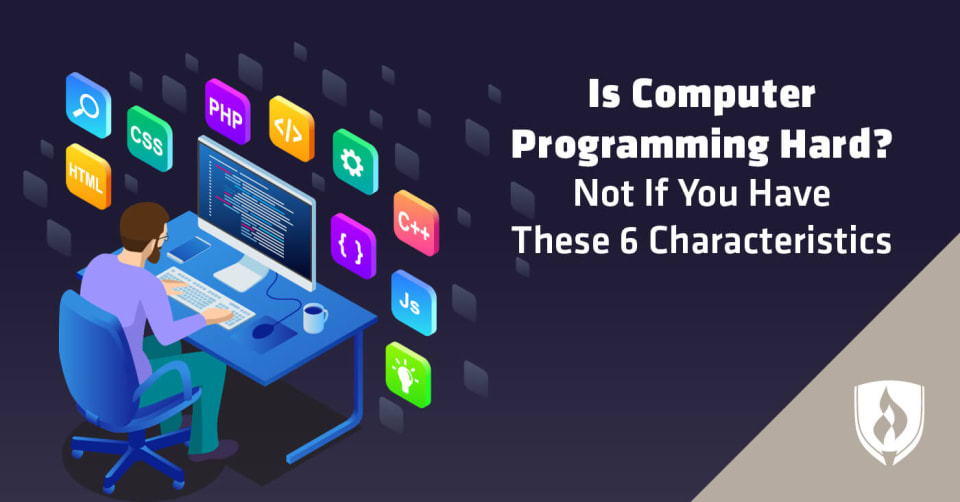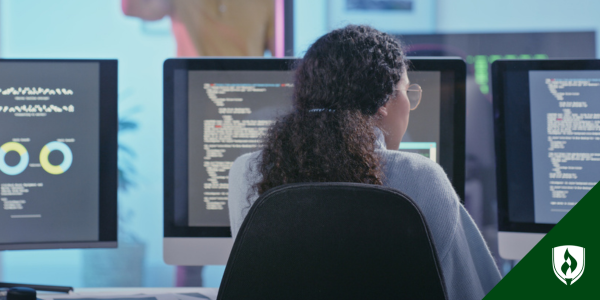Is Computer Programming Hard? Not if You Have These 6 Characteristics
By Lauren Elrick on 05/03/2017
In a world that’s blossoming with innovation rooted in technology, nearly every company has implemented computer programs in some form to help streamline their business. And behind every computer application and software program, there is a computer programmer who writes and tests the code to ensure they function properly.

This is an appealing profession for many tech-minded folks, but programming languages can seem pretty intimidating to the uninitiated. But in reality, is computer programming hard?
There’s no reason to assume learning to program will be a cakewalk—it will definitely take a lot of time and effort to get there. That said, a computer programming career does come a bit easier for people with the right traits and characteristics. We connected with programming pros already in the field to identify the top characteristics employers are looking for.
6 characteristics successful computer programmers share
1. A passion for computers
It might go without saying, but computer programmers generally love what they’re working with. If you were the kid who spent hours playing and tinkering with the code of computer games, and helping the adults in your life make their technology function well, a career that focuses on computers will likely be a great fit for you.
It’s certainly a jump from setting up your grandma’s new computer to developing software, but there’s no denying you’ll need to feel comfortable working with technology. Having a grasp on how hardware functions will ultimately guide the software created for it. So having an established comfort level with general computer-related knowledge is a great starting point.
2. Patience
Lines of code, problem solving and customer service all have one thing in common: They require a lot of patience. If you’re someone who gets easily ruffled and annoyed, a job in computer programming may not be ideal for you. Debugging software can take a lot of time and effort, with many dead ends along the way. Patience and a methodical nature are valuable skills for any programmer to possess.
“Programming is not painless,” says Victoria George, General Manager at The Coder School. “Your IDE will tell you if your program works or it doesn’t without sugar coating. You need to learn to be creative, persistent and resilient.”
3. A penchant for problem solving
Writing code and creating software exists in order to make things easier for companies, systems and the general public at large. If you see the world as a puzzle to be solved, you’ll like the mysteries and complexities found in the realm of computer programming.
If you’re inspired by riddles and like the challenge of fixing what doesn’t work, you’ll enjoy programming. Think of programming as digital tinkering—sometimes you’ll have to dig into the “guts” of a computer program and try to work backwards to figure out how to solve an issue.
4. A desire to put things in order
“Paying close attention to detail is a must with computer programming because one tiny mistake can cause a domino effect,” says Jonathan Razza, Senior Director of emerging technologies at Liaison Technologies.
If you have an affinity for ordering things so that they’re “just so,” you might find a lot of satisfaction in writing code and creating software. Computer programs require a logical series of inputs and actions to create a desired outcome, so having a perfectionist’s eye for detail and organizational ability will serve you well.
5. A love of learning
The world of technology is ever shifting, and new trends and information are being produced on the tech front every day. Not only are computer programmers continually learning how things work and how to properly put the pieces together, but programming language and code, as well as technologies and tools, are constantly evolving.
“A lot of jobs might also expect you to learn a technology they use that is slightly different from what you are used to,” says Ben Fremer, web developer and founder of Best SEO Tools. “The underlying concepts are generally the same, so it’s more like learning new ways to apply to your skills” He goes on to explain that as one technology declines in popularity and another surges, the best programmers are able to adjust their skills accordingly to stay marketable.
While a degree in the field will certainly prepare you for your career, the learning doesn’t stop once you have your diploma in hand. It’s important that programmers stay curious and continue taking the initiative to keep learning throughout their career.
6. A desire for efficiency
Does a poorly-loaded dishwasher or backtracking on a road trip get under your skin? You might have the perfect mindset for programming. It may seem silly, but programmers spend a lot of their time eliminating redundant work or finding ways to automate tedious processes. Brian Geisel, CEO of Geisel Software, sees this desire for efficiency as a sort of productive laziness.
“If you’re lazy enough, you’ll work hard to make sure you never have to do anything twice on a computer,” Geisel says.
Much of a programming career is seeking out the best possible way to solve a problem or do a task, so if you are wired for efficiency and get a kick out of maximizing time, you’ll find quite a bit of satisfaction in programming work.
Are you programmed to become a programmer?
Do the above characteristics sound like you? If so, you may have found your perfect career match! While others may find computer programming is hard, your inherent abilities and interests might make you a natural fit.
But what kinds of careers could this skillset lead to? Learn more in our article, “9 Programming Careers for Coding Connoisseurs.”
This article was originally published in 2014. It has since been updated to include information relevant to 2017. Insight from Brian Geisel remains from the original article.




